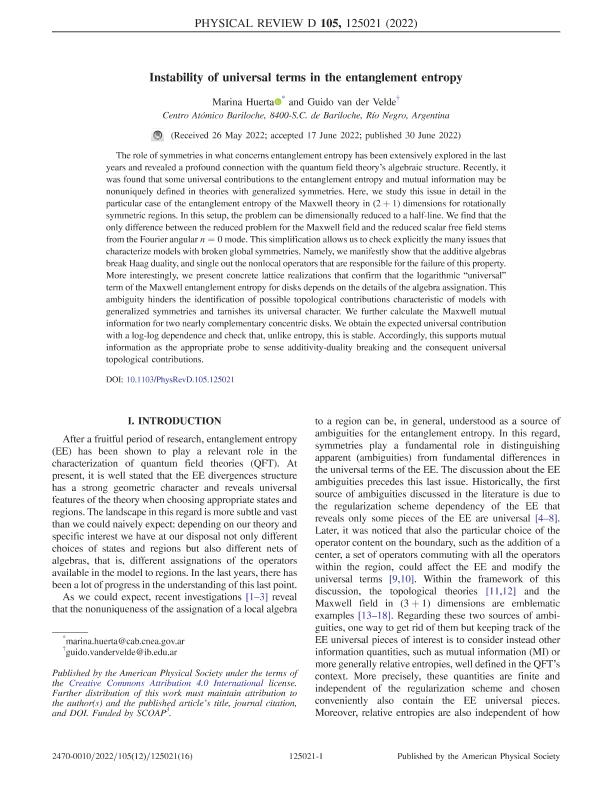Mostrar el registro sencillo del ítem
dc.contributor.author
Huerta, Marina

dc.contributor.author
Van Der Velde, Guido Gustavo

dc.date.available
2023-11-02T11:22:51Z
dc.date.issued
2022-06
dc.identifier.citation
Huerta, Marina; Van Der Velde, Guido Gustavo; Instability of universal terms in the entanglement entropy; American Physical Society; Physical Review D; 105; 12; 6-2022; 1-16
dc.identifier.issn
2470-0010
dc.identifier.uri
http://hdl.handle.net/11336/216820
dc.description.abstract
The role of symmetries in what concerns entanglement entropy has been extensively explored in the last years and revealed a profound connection with the quantum field theory's algebraic structure. Recently, it was found that some universal contributions to the entanglement entropy and mutual information may be nonuniquely defined in theories with generalized symmetries. Here, we study this issue in detail in the particular case of the entanglement entropy of the Maxwell theory in (2+1) dimensions for rotationally symmetric regions. In this setup, the problem can be dimensionally reduced to a half-line. We find that the only difference between the reduced problem for the Maxwell field and the reduced scalar free field stems from the Fourier angular n=0 mode. This simplification allows us to check explicitly the many issues that characterize models with broken global symmetries. Namely, we manifestly show that the additive algebras break Haag duality, and single out the nonlocal operators that are responsible for the failure of this property. More interestingly, we present concrete lattice realizations that confirm that the logarithmic "universal"term of the Maxwell entanglement entropy for disks depends on the details of the algebra assignation. This ambiguity hinders the identification of possible topological contributions characteristic of models with generalized symmetries and tarnishes its universal character. We further calculate the Maxwell mutual information for two nearly complementary concentric disks. We obtain the expected universal contribution with a log-log dependence and check that, unlike entropy, this is stable. Accordingly, this supports mutual information as the appropriate probe to sense additivity-duality breaking and the consequent universal topological contributions.
dc.format
application/pdf
dc.language.iso
eng
dc.publisher
American Physical Society

dc.rights
info:eu-repo/semantics/openAccess
dc.rights.uri
https://creativecommons.org/licenses/by-nc-sa/2.5/ar/
dc.subject
Maxwell field
dc.subject
Entanglement
dc.subject
symmetries
dc.subject.classification
Física de Partículas y Campos

dc.subject.classification
Ciencias Físicas

dc.subject.classification
CIENCIAS NATURALES Y EXACTAS

dc.title
Instability of universal terms in the entanglement entropy
dc.type
info:eu-repo/semantics/article
dc.type
info:ar-repo/semantics/artículo
dc.type
info:eu-repo/semantics/publishedVersion
dc.date.updated
2023-11-01T11:15:42Z
dc.identifier.eissn
2470-0029
dc.journal.volume
105
dc.journal.number
12
dc.journal.pagination
1-16
dc.journal.pais
Estados Unidos

dc.description.fil
Fil: Huerta, Marina. Comisión Nacional de Energía Atómica. Centro Atómico Bariloche; Argentina. Consejo Nacional de Investigaciones Científicas y Técnicas. Centro Científico Tecnológico Conicet - Patagonia Norte; Argentina
dc.description.fil
Fil: Van Der Velde, Guido Gustavo. Comisión Nacional de Energía Atómica. Centro Atómico Bariloche; Argentina. Consejo Nacional de Investigaciones Científicas y Técnicas. Centro Científico Tecnológico Conicet - Patagonia Norte; Argentina
dc.journal.title
Physical Review D
dc.relation.alternativeid
info:eu-repo/semantics/altIdentifier/doi/http://dx.doi.org/10.1103/PhysRevD.105.125021
Archivos asociados
